Last August Lliana Bird and Josie Naughton were just two friends with interesting jobs in London, vibrant social lives and a good set of contacts. Bird, who is 34, is a writer and radio presenter, and 31-year-old Naughton had spent 10 years making her way up in music management to work for Coldplay. They had beliefs and ideals, and had gone on the odd march, but they weren’t activists. Political engagement did not go much beyond putting up an opinionated Facebook post. Then the refugee crisis began to encroach on the holiday headlines and, like a lot of people, they both wondered how they might help.
Bird noticed that her old acting teacher, a Zen monk named Tom Radcliffe, had posted on Facebook saying he was going to raise £1,000, get in his car and drive to the refugee camp in Calais. She and Naughton offered to help. At a lunch with their mutual friend, the TV presenter and author Dawn O’Porter, the three women decided to start a hashtag #HelpCalais, with the aim of getting enough money and clothes together via Twitter to take a van to France.
With their Twitter followers, social media savvy and background in promotion, it wasn’t difficult to reach out to a few thousand people. Still, they weren’t prepared for just how quickly things would escalate. Naughton would soon quit her job and both women would be scrambling to exploit their celebrity contacts. But most surprising of all, they would find themselves ahead of all the established charities and agencies, at the forefront of the momentous task of feeding, housing and looking after tens of thousands of refugees across Europe.
In the first few days of their appeal, so many donations arrived that they had to find storage space, which the company Big Yellow donated for free. Then Dani Lawrence turned up, also wanting to help. A 43-year-old mother of three who runs an import company with her husband, she told me she had personal reasons for coming on board. As she, Naughton and Bird made one of their regular Eurostar trips to Calais last week, Lawrence explained her motivation: “My father’s Moroccan, and he left when he was 17 in a boat to a refugee camp in Gibraltar, and then a bigger one in Marseille.”
Eyes watery with emotion, she continues: “He left without family, papers or passport. So the images of refugees in the summer resonated with me. If people hadn’t helped my dad, I kind of wouldn’t be here, so I had to help in some way.”
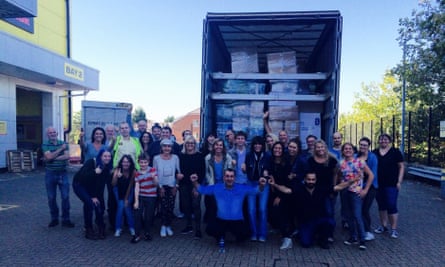
Bird’s sister, who lives in Tel Aviv, became supply manager, setting up an Amazon wish list so that anyone who wanted to donate could order a tent, sleeping bag or any other essential for the homeless and dispossessed.
A week after they started, the image of three-year-old Syrian Alan Kurdi flashed around the world, showing his body washed up on a Turkish beach after his family’s dinghy capsized en route for Greece. The three women were deeply affected by the photograph. They were not alone. Bird’s sister in Israel called her to say that there was a glitch with the Amazon wish list. “She said, ‘I keep putting on 100 pairs of boots, 200 sleeping bags, 300 tents, and they keep disappearing’,” recalls Bird. “I had a go, and suddenly we realised that they were disappearing because people were buying them.” They got a call from Big Yellow asking how many volunteers they had. The answer was six. They were told they were going to need many more: 7,000 packages had arrived in a day, and would continue to come at a similar rate for the next five weeks. Again the women used social media to drum up support, and hundreds of volunteers turned up, from out-of-work actors to concerned grandmothers. They needed to be fed, so the women used their persuasive powers, and Domino’s Pizza and Nando’s did the rest.
They now had 15 storage rooms. What had started out as a goodwill gesture had turned into an industrial process. They had to learn about transportation, distribution, palletising. Enter a prison logistics officer named Ash, eager to help. “We had all this stuff and no way of shifting it,” says Lawrence. “So we went to Calais for the night, all four of us in my car.”
“We didn’t know what to expect,” says Naughton. “We actually thought we might get there and there would be a large, you know, UNHCR or Red Cross camp, and there would be a warehouse.”
“But there was nothing,” says Lawrence. “No warehouse. No big organisations. No structure. Just a load of amazing people, working there on the ground.”
At this stage, most people would have congratulated themselves for their good deed and beat a hasty retreat home. But two encounters made them want to redouble their efforts. The first was with a remarkable woman called Liz Clegg, a former firefighter from Glastonbury who was organising food and aid at the camp. She had seen well-intentioned people come and go without really improving the situation. She was sceptical about the group, who were calling themselves Help Calais at the time. They had to prove they were committed if she was going to work with them.
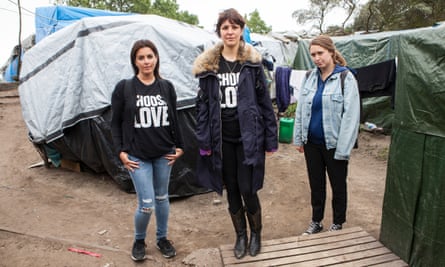
The other meeting was with a 15-year-old Syrian boy. “He had the most beautiful eyes,” says Lawrence. “I asked him his story. He said, ‘My parents smuggled me out, and I went from Turkey to Lesbos on a boat that started sinking.’ The people smugglers attempted to keep the boat afloat by throwing off all the unaccompanied boys to drown. And the boy said: ‘I realised what was happening so I linked my arm with the boy next to me, who was also without family, and I said: We’re brothers, we’re brothers, they won’t throw us off.’”
Lawrence pauses, welling up again. Having survived the journey, the boy was now alone in Calais. “I said, ‘What do you mean you’re on your own?’ He said, ‘I’m on my own.’ I was thinking, how can he be living on his own? I have a 14-year-old. ‘What can I bring you?’ I asked. And he looked me in the eyes, full of tears, and said ‘I don’t want anything. Just bring me my mum.’ I broke down. We all broke down. That was the moment we realised we couldn’t stop.”
Ten months on, and Help Refugees, as they’re now called, has 26 projects going on across Europe. It has raised £2m and another £1m worth of goods and services, with close to zero overheads. At times it has been feeding 20,000 people a day. It has recruited the support of well-known figures including Benedict Cumberbatch, Lena Dunham, Elizabeth Gilbert, Jude Law, Tom Stoppard and Juliet Stevenson. It has built 1,500 solid structure shelters at the camp in Calais, going where other major charities fear to tread, and in the process saving countless lives.
How these three women – with no real charitable experience – turned themselves within a few months into one of the most effective humanitarian response organisations anywhere on the continent is a story not only of exceptional dedication and determination but also of a new kind of rapid mobilisation based on social media and grassroots action. As good as their word to Clegg, they returned to Calais on 15 September to open a warehouse. The speed of these amateurs put many professional charities to shame. For various reasons, political and structural, the major NGOs were not set up to react to a migration crisis in Europe. As the camp outside Calais, nicknamed the “Jungle”, was not legally recognised, it presented bureaucratic problems for longstanding agencies.
But the women had their own problems. How do you run an empty warehouse? Lawrence found herself in a DIY superstore on the outskirts of Calais, looking for shelving materials for storage. A stranger asked what she was doing. She told him, and he said he’d pay for the shelves, which came to £900. He’d raised £5,000 in Ireland, and didn’t know what to do with the cash. The women are full of anecdotes like this, featuring moments of crisis when ordinary people proved to be extraordinary.
They needed someone to stay in Calais for a week to look after the warehouse. Their friend, Philli Boyle, offered to do it. She ended up staying nine months. Another friend, Nico Stevens, who was just 24, moved out to France to deal with volunteers and arrange shelter allocation. What the women quickly recognised was that the volunteers needed to be supported, empowered and organised. Back in London, they were putting in 18-hour days around their jobs. “We didn’t have an office,” says Lawrence. “We worked around my kitchen table. I’d take the children to school then work with the team, leave them working, then get the kids, and then they’d eat with my kids. The kids understood, and my husband has been incredibly supportive.” They were, Lawrence says, “the accidental charity”. She says she’ll always put her children first, but has effectively given up working on her business.
By January, Naughton realised she had to give up her job, too. “It was a huge decision, but I was obsessed with doing this.” She acknowledges that, being single and living alone, she finds it hard to know when to stop work. “I struggle with that. Basically, I don’t see my friends or family any more. This is completely my calling. There will have to be a time when balance comes back. I hesitate to say this, because the situation is so awful, but I’m more fulfilled now than I’ve ever been.”

All the women have at times felt overwhelmed by the workload and responsibility but have drawn encouragement from each other and inspiration from the volunteers, and the refugees themselves. Bird not only works as a DJ and writes for the Huffington Post, she is also writing a book on weird science. “The way to deal with it is to work seven days a week, sometimes up until 3am. There have been moments when we’ve all felt like walking away but we’ve pulled each other through it. Working with your best friends makes it easier. I couldn’t have done it without them, and the support of my partner.”
She lives with Noel Fielding, the comedian best known for The Mighty Boosh. He jokes that since she started Help Refugees, she’s taken to dressing like Bob Geldof. But, like the other two, she’s keen to crush the idea that she’s a saint. She speaks for them all: “Every time I feel exhausted I remember how hard the incredible teams on the ground work, how much they’ve sacrificed to be there, and I remember the refugees themselves, how they’ve lost everything, how resilient and strong they are, how my life is a bed of roses compared to theirs, and that being able to work is actually a privilege.”
In Calais, on the forecourt of two large warehouses, 24-year-old Hettie Colquhoun is giving the morning briefing to 50 volunteers, nearly all in their 20s. First the group does limbering up exercises, then they hear the day’s plans – and the news that many migrants have been arriving in recent days. People are selected to do particular tasks, and Colquhoun finishes with an inspirational speech, telling the crowd that they represent the best of the human spirit.
She’s not wrong. From a distance, it all looks a bit Glastonbury, a colourful scene of festival chic, but there’s no empty posing about Colquhoun or the people she’s addressing. They’re motivated, hardworking and fiercely conscientious. On an earlier visit, the playwright Tom Stoppard was so impressed by Colquhoun, he said she should become prime minister.
Another young woman – Help Refugees cannot be accused of being male-dominated – 22-year old Melissa Colak reminds the group that it’s the start of Ramadan, and extra sensitivity should be displayed: they shouldn’t eat publicly or play music, and Colak also tells them the most appropriate greeting to use.
Bird tells me that Help Refugees has two abiding principles. “Always find out from the volunteers on the ground and the refugees themselves. Don’t think you know best. And the second thing is that although providing the essentials of humanitarian aid is so important, dignity also really counts, and that can be overlooked. People are deserving of our help but also our respect. That’s at our core.”
Colak and 25-year-old Cecile Burton show me around the warehouses. They are stacked with tents, backpacks, shoes and mountains of clothes. There’s a shortage of men’s shoes, says Burton, because donors tend to think only of women and children and assume that men can fend for themselves. “But they still need shoes,” she says.
Most of the volunteers come and go under their own steam, but some stick around, and there is a core, of which Burton and Colquhoun are part, whose accommodation and living expenses are paid by Help Refugees.
Seventy per cent of the donations come from Britain. After a while, Help Refugees realised that Amazon wish lists were not ideal. There was difficulty getting the supplies palletised and over to France, so Bird tasked her sister with finding an alternative. “She finally found this guy called Paul, who’s been absolutely amazing,” says Bird. “He runs this small campsite equipment company called Leisure Fayre and they put us on the home page of their website. It says Buy a Gift for a Refugee. It has all the goods we need.” Each week Leisure Fayre fills up a big van of goods that the public has donated through its website and sends it all, free of charge, over to Calais.

As we walk into the kitchens, at the front of the warehouse, where hot meals for 2,000 are produced, the Rolling Stones’ Gimme Shelter is playing. Never has a song title seemed more appropriate. But for all its sprawling collections of goods and hectic activity, the warehouse is a refuge of calm, a place where like-minded souls can get on with some of the essential logistics of humanitarian aid. The real action, of course, takes place in the Jungle.
There have been several camps around Calais since the French government closed down the Sangatte migrant reception facility in 2002. The authorities have raided and dismantled them over the years, only for another to spring up almost immediately. The current main encampment lies on charmless wasteland to the east of the town, just beyond the perimeter road. You enter beneath a graffiti-covered flyover with a Banksy artwork depicting Steve Jobs, the son of a Syrian migrant, carrying an Apple computer and a bin bag of possessions. Around it, someone has sprayed “London Calling” and next to that “Nobody deserves to live this way”. Standing guard are several police kitted out in Robocop-style riot gear.
There’s a clearing with a football pitch, a row of jerry-built shops, makeshift mosques, a couple of churches, a school, washing facilities, portable toilets, and 1,500 tightly packed wooden shelters, all built by volunteers working under the Help Refugees umbrella, where 5,188 refugees and migrants from Sudan, Eritrea, Ethiopia, Afghanistan, Syria and elsewhere live while they attempt to reach the UK.
That precise figure comes from the meticulous censuses that Help Refugees conduct each month to track the camp’s makeup and population, and to counter the French authorities’ tendency to underestimate numbers.
There is also within the camp a fenced-off area of large white residential containers run by the French, to which Help Refugees has no access. Movement is restricted within this area and there is a strict curfew, but in many respects it’s a safer and cleaner environment than the surrounding shanty town.
Each day Help Refugees, which provides welcome packs of sleeping bags and other essentials to new arrivals, distributes specific goods to three sites on the camp. Tuesday is shoes day, Wednesday is jackets, Fridays trousers.
But now, after a recent fire, they’re trying to work out how to replace the shelters that were destroyed. A 23-year-old graduate in French and philosophy with the wonderful name Liv Long is overseeing the rebuilding. I suggest that her degree subjects, while not necessarily the ideal preparation for working out how to house refugees, must have come in handy in Calais. “Well,” she says, surveying the scorched land where the shelters were destroyed, “I haven’t had much use for the French.”
The French authorities won’t allow any more building so it can be difficult to get the constructions into the camp. For the moment, Help Refugees have deployed tents, which are not ideal, especially when it rains.
And here you reach the central paradox of the camp. No one wants it to exist, not Help Refugees, not the British or French authorities, not even the people that live there. They would like to see it disappear – but for different reasons.
It’s the human suffering that concerns the women behind Help Refugees. And to alleviate it neither Bird nor Naughton have been shy in using their connections. When Liz Clegg announced that she needed a double-decker bus for a women and children’s centre, the actor Juliet Stevenson, brought to the camp by Help Refugees, made sure that one arrived within 12 days.
Clegg and her daughter, Inca Sorrell, look out for the Jungle’s 420 unaccompanied children. One of Clegg’s initiatives that Help Refugees financed was to give every child a mobile phone with credit. Just how vital that step proved to be was witnessed by Naughton when she accompanied Clegg and Sorrell in March to the Women in the World Conference in New York. Naughton recalls: “Inca got a text message from Ahmed, who was seven years old.”
The message read: “I ned halp darivar no stap car no oksijan in the car no signal iam in the cantenar. Iam no jokan valla.”
Sorrell instantly worked out that this meant: “I need help. The driver won’t stop the car. No oxygen in the car. No signal. I’m in a container. I am not joking. I swear to God.”
She called the Afghan boy and spoke to him, while Naughton contacted the Help Refugees office in London. They called the police, who traced the phone to a motorway service station in Leicestershire. In a sealed lorry, they found Ahmed and 14 adults hidden in the airless container.
That’s 15 lives saved by Help Refugees money, and there have been plenty more. Last October the Moira refugee camp in Lesbos was overrun by new arrivals, with some 5,000 people under the care of half a dozen volunteers. The situation was dire, with disease breaking out, so Help Refugees put out a message for doctors and medics, offering to pay for flights and accommodation if they could commit to more than a week. They managed to fund 30 doctors, one of whom, Dr Linda, called Naughton and, shocked by the conditions she found, told her that she had a month before children started dying.
“That day Josie rang me,” says Bird, “and told me what Dr Linda had said. She was crying a lot. We thought, it’s not right that we’re the ones dealing with this. We didn’t know what to do, so I wrote an article for the Huffington Post and they put it on the front page in the UK and the US. The title was “The Children’s Feet Are Rotting You Guys Have One Month and Then All These People Will Be Dead.”
The response was immediate. “We got £80,000 in one week,” says Bird.
It also opened the way to an ongoing relationship between Lawrence and an American woman called Amy Olrick, who is part of a group called the Compassion Collective, which features writers like Elizabeth Gilbert of Eat Pray Love fame and Cheryl Strayed, who wrote Wild. During a 48-hour fundraising drive, which involved Lena Dunham and Reese Witherspoon, they raised $1m for Help Refugees.
The money has been put to active use, feeding and clothing refugees across the islands of Chios, Samos, Kos, Lesbos and on the Greek mainland too. At one point they were serving 20,000 meals a day in all the camps they worked in. They’re supplying mosquito repellant and baby milk to mothers in the Greek camps, which are run by the Greek military, and they have employed an organisation called the Green Helmets to build floors for the military tents, which are on gravel and open to snakes and scorpions.
“We shouldn’t be doing that,” says Naughton. “A larger organisation should be doing it. If they came along and said we want to floor all the tents in the camps, that would be brilliant.”
We eat lunch in an Afghan restaurant in the Jungle and make our way back to Britain. Our trip home is effortless, but for the people we leave behind it is an impossible journey that they dream every night of making. On the train the women tell me more about their plans, while constantly reminding me that they are simply facilitators, and it’s the volunteers on the ground who really make the difference – and the refugees who really matter.
That’s true, of course, but the fact remains that they have stepped into a massive void where few governments or established NGOs are prepared to go. They’ve fed the hungry and housed the homeless, and there are people living now thanks to them who would otherwise be dead.

They knew very little about charity, fundraising or organising humanitarian aid when they started, but they never let that stop them. Instead of waiting for someone else better qualified and more experienced to do the job, they got on with it. And when doors were closed, they just pushed harder.
I ask them as the train pulls into St Pancras, London, what they would say if Oxfam came along and said they’d take over the operation.
“Great,” says Lawrence.
“We’d say ‘fantastic!’” says Naughton.
Bird looks more pensive. She says that she’s heard from that charity that they would indeed like to partner with Help Refugees.
“But I don’t agree that we’d let them take over everything. Not being a charity that’s been around for 75 years, not having the name that they have – it comes with great knowledge but they have a lot to lose, so they have to do things a certain way. If we can work together with them, and they can help us with their knowledge and support network, that would be best.”
Whatever agreements the European Union reaches with Turkey, and whatever unfolds in Syria, Libya and beyond, the refugee and migration crisis is not going away anytime soon. That’s something we all have to think about. The good news is that the inspiring women from Help Refugees look like they’re going to be sticking around for a while too.
Moved to action: other grassroots responses
Migrant Offshore Aid Station (Moas)
Appalled by the lack of response to the hundreds of refugees who drowned at sea near the Italian island of Lampedusa in 2013, American millionaire entrepreneur Christopher Catrambone and his Italian wife, Regina, founded the Malta-based Moas in 2014 after converting a 40-foot Canadian fishing boat into the Mediterranean’s first private search-and-rescue vessel. The couple have ploughed millions of their own money – made through providing insurance in conflict zones – into the charity, which has in its first two years rescued nearly 12,000 people at sea.
Project Amal ou Salam
Translated as ‘Project Hope and Peace’, this organisation aims to instil in Syria’s schoolchildren the same happiness and hope that its founder, Syrian-born Canadian Nousha Kabawat, felt growing up in peacetime Syria. Through workshops, summer camps and a permanent school in Jordan, since 2013 the project has affected the lives of more than 5,000 children in Turkey, Lebanon, Jordan and Syria.
Lighthouse Relief
Founded in Lesbos in 2015 by a small group of multinational volunteers concerned by the lack of aid on offer to the increasing number of refugees arriving on the island, the organisation now operates in camps across Greece and is registered in Sweden.
International Network for Aid, Relief and Assistance (Inara)
Arab-American Arwa Damon, a CNN reporter, co-founded Inara in Lebanon in 2015 to provide medical treatment to children from conflict areas suffering from burns, bomb injuries and malnutrition-related afflictions such as cataracts, and who wouldn’t otherwise be treated. Daisy Dunne
How you can help
With more than a million refugees in Europe, the need is still great. You can donate to help provide hot food, clothes, baby milk and essential medical care at helprefugees.org.uk
You can also buy a sleeping bag, blanket or tent for a refugee, which will be delivered to them by visiting: helprefugees.leisurefayre.com
To volunteer in Calais, email volunteerincalais@gmail.com
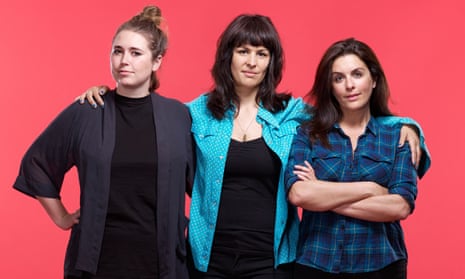

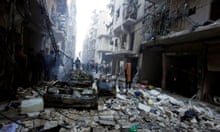


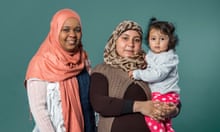


Comments (…)
Sign in or create your Guardian account to join the discussion